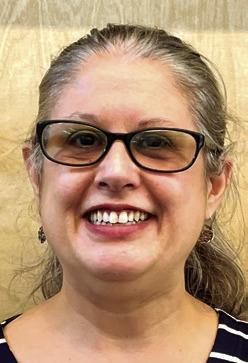
Graphic from Metro Creative

SAN MARCOS PUBLIC LIBRARY
625 E. HOPKINS ST.
512-393-8200
Answers to Go
Q.MLK Day is this weekend and I want to learn more about Martin Luther King, Jr. as a man - not just the history of the holiday. What can you tell me about him and where can I read more information about him?
A. The library has hundreds of books and DVDs about MLK Jr. Martin Luther King Jr. was a Baptist minister and a civil- rights activist who had a seismic impact on race relations in the United States, beginning in the mid-1950s and continuing until today.
Among his many efforts, King headed the Southern Christian Leadership Conference, he played a pivotal role in ending the legal segregation of African American citizens in the United States, helped create the Civil Rights Act of 1964, was instrumental in the Voting Rights Act of 1965 and won the Nobel Peace Prize in 1964.
MLK Jr.’s grandfather A. D. Williams was a rural minister when he moved to Atlanta, Ga. in 1893. He took over the struggling Ebenezer Baptist Church and built it up from around 13 members into a forceful congregation. A. D. married Jennie Celeste Parks and they had one child, Alberta - MLK Jr.’s mother. Martin Sr. came from a family of poor sharecroppers and married Alberta in 1926 after an eight-year courtship. When A. D. passed away in 1931, Martin Sr. stepped in as pastor. He too became a successful minister and adopted the name Martin Luther King, Sr. in honor of the German Protestant religious leader Martin Luther. He changed his son’s name “Michael, Jr.” to Martin Luther Jr., too.
MLK Jr. grew up in Atlanta where he entered the public school system at age five. He advanced through school quickly, skipping both ninth and 11th grades. This allowed him to enter Morehouse College at age 15, in 1944. Although King’s family was deeply religious, as a youth MLK Jr. was not. It was not until his junior year at Morehouse when he took a bible class that his faith was renewed, and he became to believe that a career in the ministry was what he wanted. Eventually, MLK Jr. would be co-minister with his father at Ebenezer Baptist Church until his assassination on April 4, 1968.
MLK Jr. was imprisoned 29 times, mostly for civil-disobedience and on trumped-up charges such as when he was jailed in Montgomery, Ala. for driving 30 miles per hour in a 25-per-hour zone. His first speech of note was during the Prayer Pilgrimage for Freedom. It was his first national speech on the topic of voting rights. Before a crowd of more than 15,000 people, he urged America to “give us the ballot.” This speech drew strong reviews and positioned him at the forefront of the civil rights leadership.
His work on civil rights made him a target. In 1958, while signing copies of his new book, Stride Toward Freedom he was approached by Izola Ware Curry. The woman asked if he was Martin Luther King Jr. After he said yes, Curry said, “I’ve been looking for you for five years,” and plunged a seven-inch letter opening into his chest. The tip of the blade came to rest alongside his aorta, and King underwent hours of delicate emergency surgery. Surgeons later told King that just one sneeze could have punctured the aorta and killed him. From his hospital bed, King issued a statement affirming his nonviolent principles and saying he felt no ill will toward his mentally-ill attacker.
In 1957, MLK Jr. formed the Southern Christian Leadership Conference and began lecturing nationwide, urging active non-violence to achieve black civil rights. By 1963, he was helping to organize the March of Washington, an assembly of over 200,000 people where he made is famous “I Have a Dream” speech. He eventually broadened his advocacy to include the plights of all poor people and his opposition to the Vietnam war. In 1968, he went to Memphis, Tenn. to support the sanitation workers strike. It was there, on April 4, 1968, that he was assassinated.
The pain of the King family did not abate after MLK Jr.’s death. In 1974, his mother was assassinated by Marcus Wayne Chenault who was sitting in the congregation at Ebenezer Baptist, while MLK Sr. was preaching. The deranged man said that all Christians were his enemy and shot and killed the deacon and MLK’s mother, saying his real target was MLK Sr. The man was found guilty and initially received the death penalty, but because of the objections of the King family (they did not believe in the death penalty), his sentence was changed to life.
Books and DVDs:
• “Citizen King” [DVD]
• “Gospel of Freedom: Martin Luther King, Jr.’s Letter From Birmingham Jail and the Struggle that Changed a Nation” by Jonathan Rieder.
• “He Had a Dream: Martin Luther King, Jr., and the Civil Rights Movement” by Flip Schulke.
• “My life with Martin Luther King, Jr.” by Coretta Scott King.
• “Our friend, Martin” [DVD]
• “Selma” [DVD]
• “The Heavens Might Crack: The Death and Legacy of Martin Luther King Jr.” by Jason Sokol.
• “The King Years: Historic Moments in the Civil Rights Movement” by Taylor Branch.
• “The Words of Martin Luther King, Jr. by Martin Luther King.
• “To the Promised Land: Martin Luther King and the Fight for Economic Justice” by Michael K. Honey.
• “We Shall Overcome: Martin Luther King, Jr., and the Black Freedom Struggle”
Suzanne Sanders is the columnist for the library. She is the Community Services Manager for the San Marcos Public Library and came from the Austin Public Library in 2015 after having served there as a librarian for over 20 years. She gratefully accepts your questions for this column.











